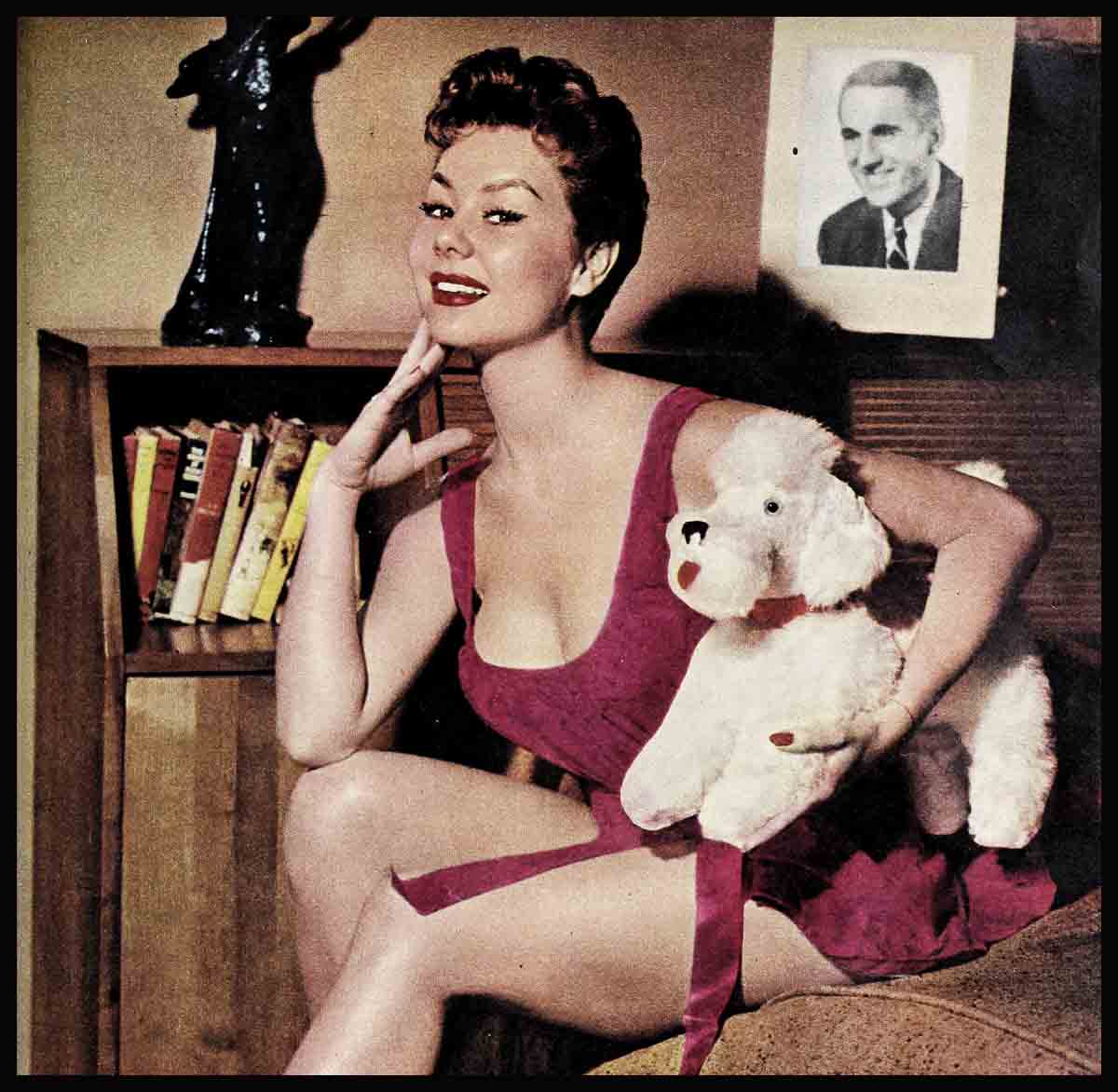
What She Goes For She Gets!—Mitzi Gaynor
A tiny brown-haired little girl bounced up to the boxoffice of the Greenwich, a neighborhood theatre, plunked down her money and took her ticket.
“What again?” kidded the usher. “You just saw the picture yesterday—twice!”
“I’ve seen it seven times already,” she answered and hurriedly disappeared into the darkened theatre into her dreamworld of motion pictures. The picture was “Lady Eve.” Her adored idol was Barbara Stanwyck. The year was 1939 and the little girl, Mitzi Gaynor. As she danced out of the theatre later that afternoon, after sitting through two performances, she vowed solemnly that someday she would play the part of Lady Eve. For even at eight, her life was full of acting, singing and dancing. She had no doubt about her future. She wanted to be in show business. And whatever Mitzi wants, Mitzi gets.
The time was June, 1955. Mitzi was tired and looking forward to a vacation with her husband Jack. Just finishing a strenuous role in “Anything Goes,” she was determined that nothing would stand in the way of a lengthy rest.
Don Hartman stood in the way between the commissary and the sound stage one day. “Mitzi,” he said, starting to pull the props out from under that long vacation, “you would be perfect in ‘Lady Eve’ with George Gobel. You’d be—well, it’s just your part.”
“When does it start?” she queried. Her heart began to pound.
“Well,” he hesitated, “it starts in a week. George only has a limited time to do the picture. It has to go fast.”
“Oh,” Mitzi wailed, “it’s too soon. Jack and I have promised ourselves a real live vacation. Just the two of us. I just can’t.”
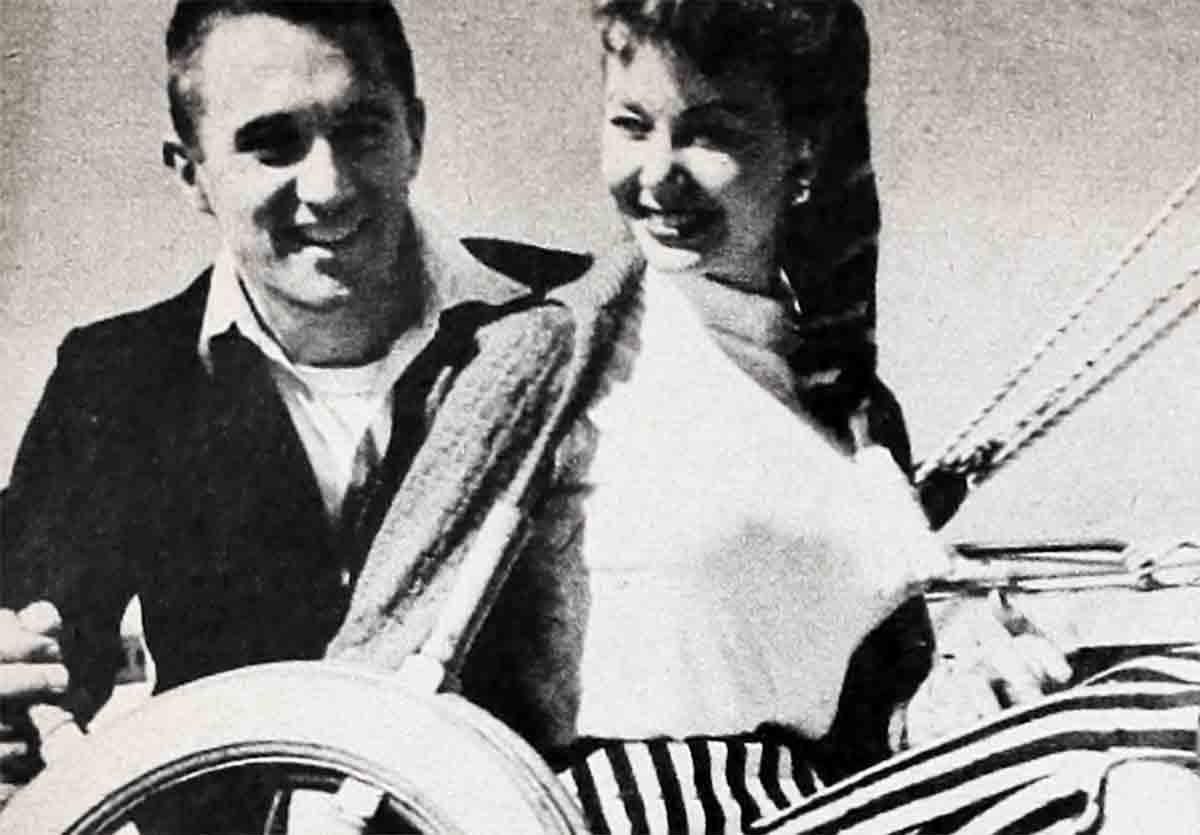
Don Hartman is not a successful executive without reason. The next day at lunch with Mitzi and Jack in the Paramount commissary he had a proposition. “We can run the schedule so you’ll have three whole weeks off without costume fittings, script work or anything.” Jack and Mitzi looked at each other for a long moment. Jack knew of her hidden desire to do the part. “Three weeks,” he said softly, “can be a lifetime.” Mitzi’s Rock of Gibraltar had spoken and she was free to do the part. She bounced up and down on her chair in delight.
“Now,” said Don, “let me fill you in on the story.”
Mitzi and Jack looked at each other again and roared. For the next hour Don Hartman sat fascinated while Mitzi told him the story of “Lady Eve” down to the finest detail.
“Jack and I decided on San Francisco and Carmel for our vacation,” Mitzi explained, reliving the wonderful memories of that trip. “Does it sound silly if I say we really wanted to get to know each other? Our honeymoon was combined with public appearances for ‘No Business Like Show Business.’ We were constantly surrounded by people. Then when we got home, Jack’s public-relations business started zooming and I went into ‘Anything Goes.’
“We figured it out one night. We were spending only fifteen per cent of our time alone,” she said. “We figured that was for the birds—not people. So in our three weeks, we really got to know each other. We found we like each other very much, which is really the best way for married people. We had a ball. We ate our way right through San Francisco: Alexis’ Tangiers, The Shadows, Blue Fox, Ernie’s Matador. Name it, we ate there.
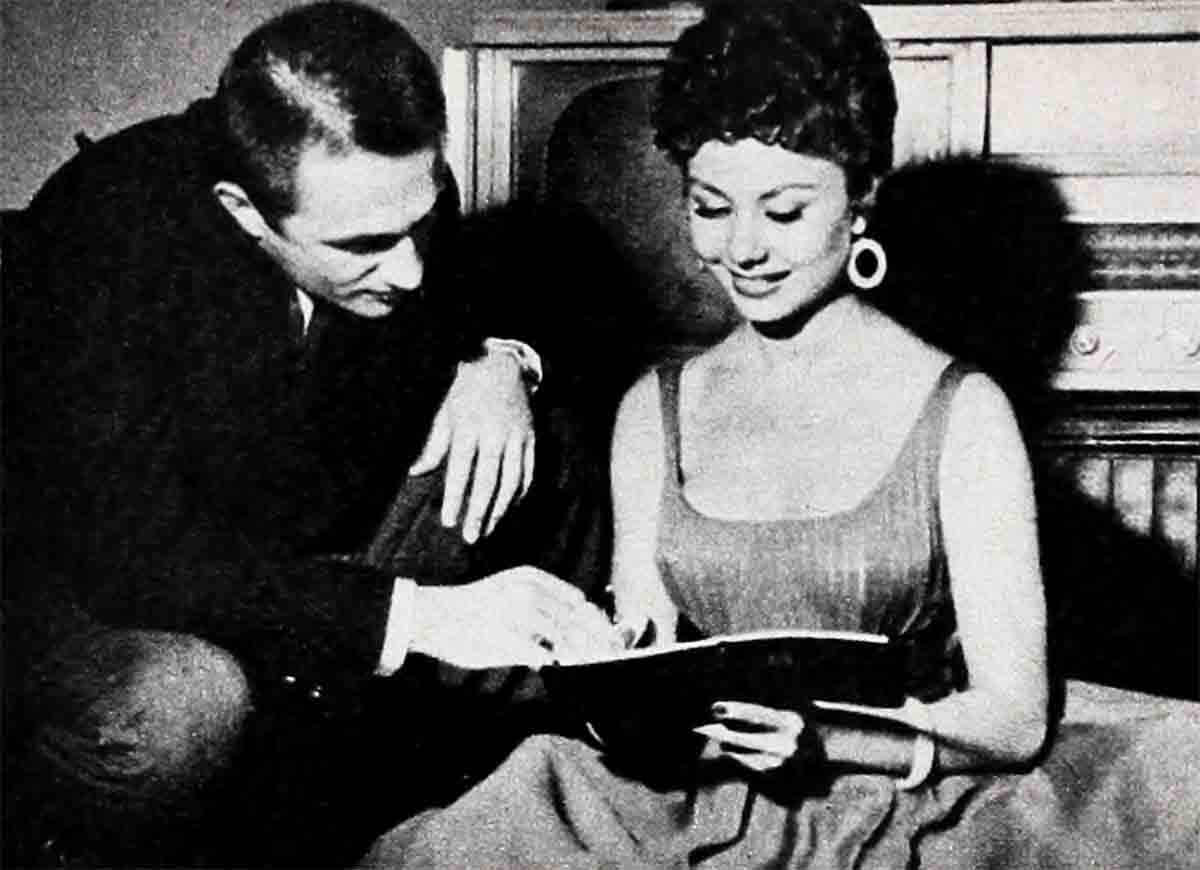
“I goofed up there though,” she added with a proper show of humility. “I wanted to stay in a bay-view suite. In fact, I insisted. So Jack made the reservations. I was really unhappy. It was hot and noisy, and those boat whistles roared on the bay all night long. I got what I wanted, but I didn’t want what I got.
“We made up for it when we got to Carmel though, didn’t we?” She gazed at her husband across the table. Jack, a picture of a contented man, smiled in agreement. “We stopped at that absolutely fabulous Highland Inn in Carmel.”
Bright with memories, she looked suddenly at Jack. “ You’re a lot of fun, Son.”
“You’re pretty comfortable yourself, Mother,” he returned with a quick grin.
Looking at Mitzi at the tender age of twenty-three, it is hard to realize that heartaches and hard knocks had an important place in her life. Electric, effervescent, bubbling with a naive warmth for everything and everybody, it is difficult to feel that she hasn’t floated through life on cloud nine.
“So many kids write and ask how to get started in show business.” Mitzi reflected. “All I can tell them is you have to want it more than anything. Be aware of every chance to practice. If five people are in a group, stand up and sing. Go to the hospitals and women’s clubs. You learn a lot. So many things happen. All of a sudden you have no accompaniment or the mike goes out. You learn to take care of yourself and you’re growing. There’s nothing like experience.

“So many times, a girl is put under contract at a studio with six-month options. She has no background in show business, but she’s pretty. Instead of immediately starting to work on diction, acting, dancing and singing, she’ll be carried away by the glamour. Languish around in night clubs being seen, and then bang, option time comes up and she’s dropped. It’s the same in any job. You very seldom have a second chance. It’s how good you are from the first and how you keep improving.
“Jack kept insisting that I continue my singing lessons,” she said with a sudden smile, “and I kept insisting I was too busy. Finally, he let me have it. He said, ‘Look, little one, you want to stay on top, you keep practicing. For every one of you on top there are five hundred taking lessons, working and praying for the day they’ll take your place. Don’t ever forget it.’ That jarred me. I hadn’t thought of it that way.”
Mitzi knows whereof she speaks. At eleven, during the war, she danced at hospitals, army posts, USO’s—anywhere she got a chance. Many members of women’s clubs remember little Mitzi while she was still toiling on a pirouette in Detroit. When her dance teacher decided to come to California, she insisted that Mitzi and her mother should come, too. “That’s where you should be,” she said firmly. “You belong there.” It was a great decision, but Mitzi wanted to come. So she and her mother came to California to start the struggle to the top.
She concentrated furiously on her work. She was publicized as nice, sweet, the girl next door. Then she cut her hair, went on a diet and became a femme fatale. It was a gay whirl and our heroine was so tres chic that she suddenly got sick of herself. “Do I want it?” she asked.
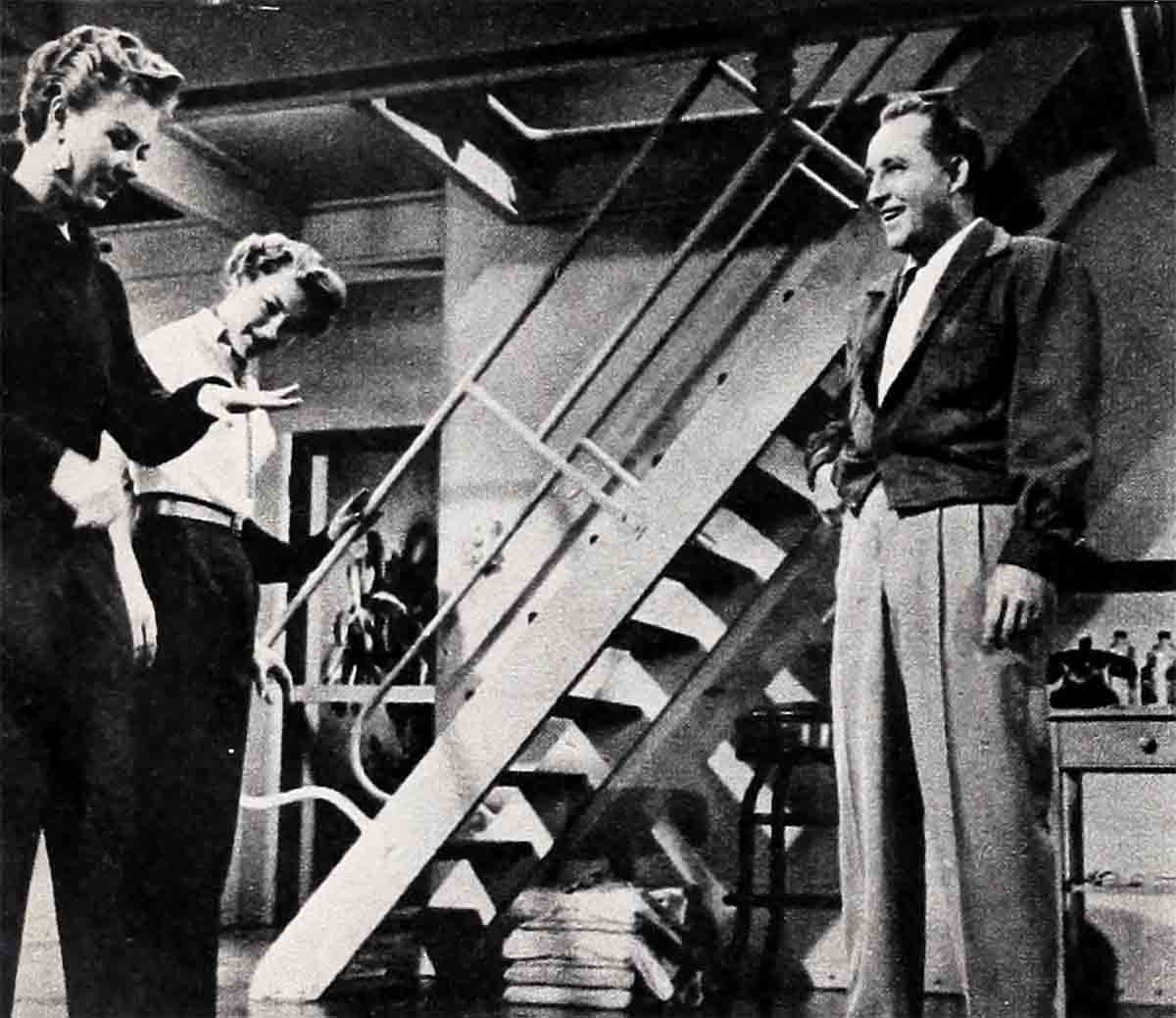
“I took a long look at myself,” Mitzi admitted, “in my glamorous mirror. I wandered through my ultra-modern penthouse, and finally came to rest on my balcony rail overlooking the city I loved. The false world I’d created for myself had served its purpose, but it was over. I didn’t need a date every night or funny sayings or sophistication. I decided to relax and find a happy medium between the girl next door and this glamour-doll stranger that stared back at me in my mirror. I really wanted to get married, but I didn’t know it then.”
And whatever Mitzi wants . . . She had a date with Jack Bean. Her own date and Jack were double escorts one night when her cousin unexpectedly became ill. After that first date, Mitzi had an emergency appendectomy. Later, lying on her comfortable bed of pain, she discovered that with all the calls and flowers, Jack Bean had not phoned and it bothered her. When he finally did call, he explained he had been out of town. He asked for a date. After their second date, they both made themselves available at all times.
“Jack was everything I wanted for a husband,” Mitzi said softly, so the subject of her conversation wouldn’t overhear her eulogy. “I didn’t realize my own emptiness until I fell in love with Jack. Then I understood my restless lack of fulfillment. I was finding for the first time warmth, security, a man to lean on and listen to, and the joy of loving and being loved. Naturally, I wanted to get married!”
Whatever Mitzi wants . . . She became Mrs. Jack Bean in a quiet, private ceremony in the lovely home of the William Frenches in San Francisco last November 18. No one, including Mitzi’s mother, shed a tear. It was a happy wedding. The bride in a sky-blue gray dress with an azure fox collar, tiny gray hat and her heart in her hands said a silent prayer that she would always make Jack happy.
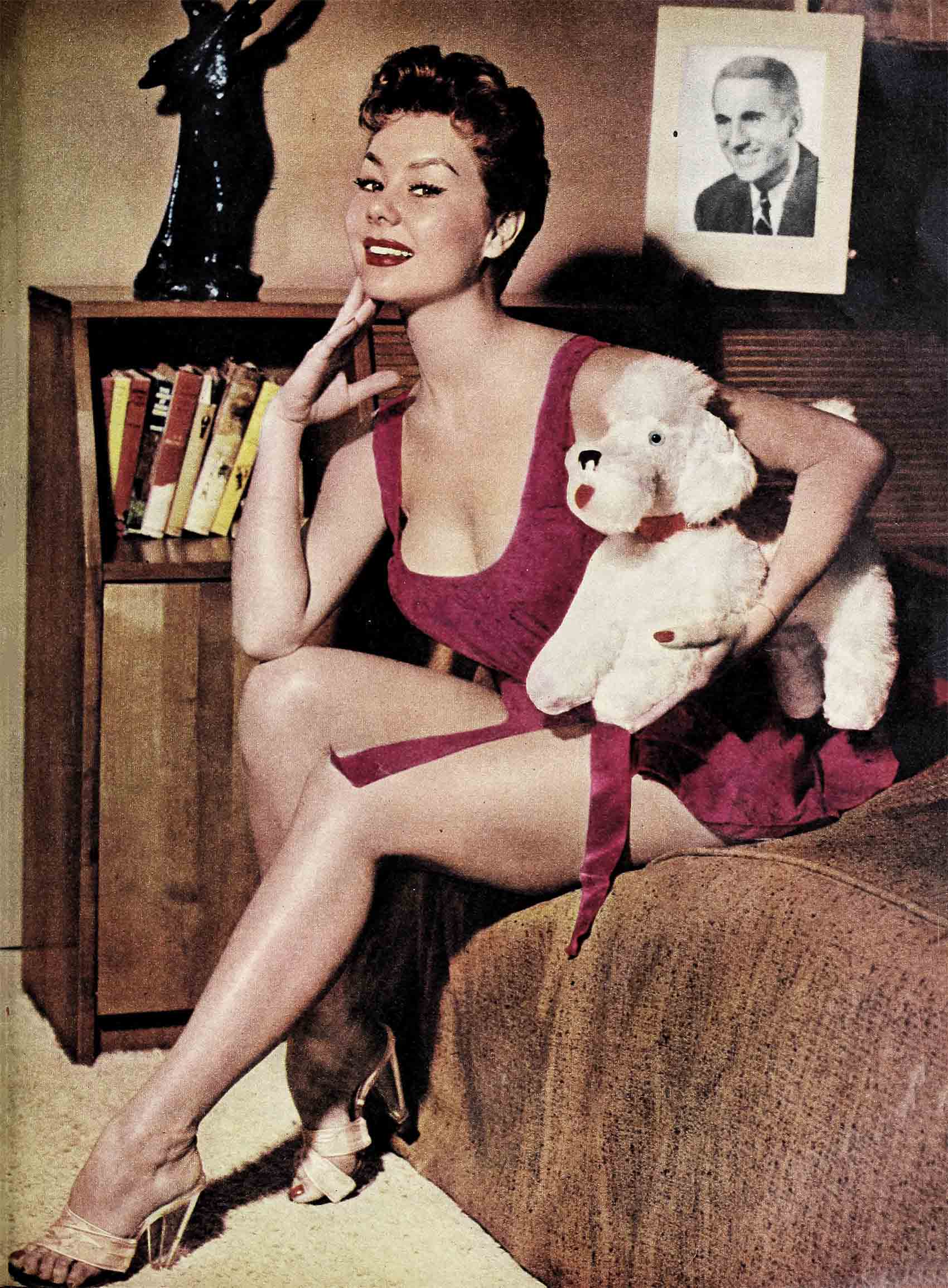
Jack’s strength and solidity gave Mitzi the courage to take a chance with her career. She asked for a release from her studio and started a free-lance career. She did two television shows with Donald O’Connor and was amazed and grateful for the reaction. Then she got the rumble that Bing Crosby would do “Anything Goes.” To her surprise, she heard over the grapevine that she would also be in the picture. She liked the gossip. “What could be greater than a picture with Crosby and O’Connor?” she asked. “I would have accepted a walk on.” Fortunately, Don Hartman didn’t know that and she was rumbled right into a lead that included singing the title song.
Again she is paired with Donald O’Conner. In “No Business Like Show Business,” they played brother and sister. In the two television shows they created a team, dancing, singing and acting, that the public hated to have separate.
Between George Gobel and Jack Bean, Mitzi is sitting on top of the world. She is fully aware of her good fortune. “I haven’t made a mistake in a year and a half,” she cried gaily looking at Jack. Then sudden superstition caused her to knock wood. Even while she rapped the table, her thoughts leaped back to her marriage.
“All I’ve ever wanted was a simple, plain marriage built on basic values. Old-fashioned things like mutual respect, laughing instead of crying, sharing the very best, and the worst, of each other, trying to give more than the other and being comfortable and honest. With Jack I have it all, plus the steady growth of confidence in myself that he gives me. We don’t,” she said softly, “need things.
“For instance,” Mitzi said, “we’re quite happy in our apartment. Neither one of us has any desire to run out and buy a lot and start building a dream home. We’re young and we don’t know what we want in a home yet. So we’ll wait until it becomes important to us. And, anyway, I want to try my hand at decorating a few times before I start on a home.”
“One way or another,” Jack commented wryly, “you do get what you want. Nicely, of course, but you manage.”
“You mean not like Lola,” Mitzi asked in mock shock.
“There have been times,” drawled Jack with relish, “when you remind me very much of Lola.”
They sat smiling into each other’s eyes, oblivious of the world around them. It’s true, whatever Mitzi wants she gets. But she also has the happy faculty of choosing the right things to want.
THE END
—BY DEE PHILLIPS
It is a quote. PHOTOPLAY MAGAZINE OCTOBER 1955




